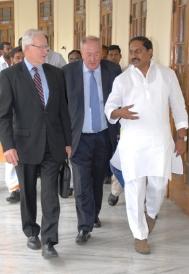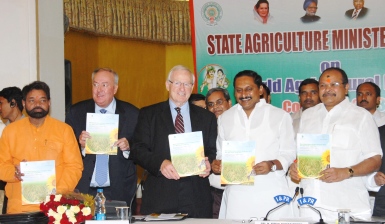
Organisation
Members
History
FAQs
Members
History
FAQs
| The World Agricultural Forum is a not-for-profit public benefit corporation established for charitable,educational and scientific purposes under Section 501 (c) (3) of the United States Internal Revenue Code. |
Updated: 5 January 2013
| Newsletter WAF-update (PDF Version Here) December 2012 |
In this issue:
Looking ahead
As we reach year-end, many will be heaving a sigh of
relief. Many of us have had enough of 2012’s crop of
droughts, floods, non-arrival of the monsoon, poor harvests
and the like which have seen see-sawing crop prices and a
consequent roller coaster ride for food prices. As usual, the
less well-off have been most affected.
However, as we look ahead, there are some positive
signs. Prices have started to stabilize. Global financial
problems look as though they might be diminishing although it
will be some many years before things get back to some sort
of normality. And energy prices seem to be stabilizing or
dropping, especially with new sources of energy coming on
stream.
Unfortunately, agriculture continues to be a forgotten
orphan in the international sea of concerns. This is
lamentable especially when one third of the global workforce
is employed in farming, agriculture is estimated to consume
some 70% of all fresh water and the population is rising and
demanding ever more food – especially protein-based
foodstuffs.
Fortunately, governments in less developed economies
pay more attention to issues of agriculture and food production
than those in the west. It is especially gratifying to see the
Governments of Andhra Pradesh and of India taking such a
lively interest in sponsoring and championing the next WAF
Congress and Trade Fair in 2013 which will be held in
Hyderabad in November. And they have chose to give
special focus to the needs of small and women farmers. We
are looking forward to a dynamic and exciting event and work
on the programme details is starting in earnest.
It remains therefore to wish all colleagues, friends and
supporters, the compliments of the season and for a Happy
and Prosperous 2013.
Ken Baker
Chairman, World Agricultural Forum
- Comment: Looking ahead
- Chief Minister Welcomes WAF to India
- India: State Agriculture Ministers’Meeting on WAF
- Congress 2013
- Board News & Events
- Prestigious Award for Advisory Board Member
- Upcoming Events
- Global Food Security: The politics of food in the
- new scarcity - Paolo De Castro
- The Last Word – Gary Blumenthal
Looking ahead
As we reach year-end, many will be heaving a sigh of
relief. Many of us have had enough of 2012’s crop of
droughts, floods, non-arrival of the monsoon, poor harvests
and the like which have seen see-sawing crop prices and a
consequent roller coaster ride for food prices. As usual, the
less well-off have been most affected.
However, as we look ahead, there are some positive
signs. Prices have started to stabilize. Global financial
problems look as though they might be diminishing although it
will be some many years before things get back to some sort
of normality. And energy prices seem to be stabilizing or
dropping, especially with new sources of energy coming on
stream.
Unfortunately, agriculture continues to be a forgotten
orphan in the international sea of concerns. This is
lamentable especially when one third of the global workforce
is employed in farming, agriculture is estimated to consume
some 70% of all fresh water and the population is rising and
demanding ever more food – especially protein-based
foodstuffs.
Fortunately, governments in less developed economies
pay more attention to issues of agriculture and food production
than those in the west. It is especially gratifying to see the
Governments of Andhra Pradesh and of India taking such a
lively interest in sponsoring and championing the next WAF
Congress and Trade Fair in 2013 which will be held in
Hyderabad in November. And they have chose to give
special focus to the needs of small and women farmers. We
are looking forward to a dynamic and exciting event and work
on the programme details is starting in earnest.
It remains therefore to wish all colleagues, friends and
supporters, the compliments of the season and for a Happy
and Prosperous 2013.
Ken Baker
Chairman, World Agricultural Forum
| Chief Minister Welcomes WAF to India Mr. N. Kiran Kumar Reddy of Andhra Pradesh, welcomed WAF Chairman Dr. Kenneth Baker and WAF Advisory Board Chairman, Mr. James Bolger to a public meeting in Parliament’s Jubilee Hall in Hyderabad and launched preparations for the WAF Congress & Trade Fair in November 2013. Indian Prime Minister Manmohan Singh will inaugurate the three-day conference on 7 November, 2013. The Chief Minister said “the Andhra Pradesh Government is hosting the World Agricultural Forum 2013 mainly with a view to project the interests of the small agriculturists of India and other such developing countries in the context of globalizing agricultural trade. Hence, the theme chosen for WAF Congress 2013 Re- shaping agriculture for a sustainable future: focus on small farm-holders, is extremely important”. He went on to say “we have already initiated steps for making all arrangements to make the WAF 2013 Congress a landmark event. We have constituted a Ministerial Committee and Secretaries Committee and The Chief Secretary is monitoring the progress of the preparations”. Agriculture Ministers and Senior Officials from other States attended the meeting and included Andhra Pradesh Agriculture Minister Kanna Lakshminarayanan, Orisa Agriculture Minister, Devi Prasad Misra, Madhya Pradesh Agriculture Minister, Mr Ramakrishna Babji, Major Industries Minister Dr. J.Geetha Reddy and IT&C Minister Ponnala Lakshmaiah all of whom addressed the meeting. Cooperation Minister K Venkata Krishna Reddy, Minister for Law E Pratap Reddy, MLC P. Sudhakar Reddy, Secretaries and top Agricultural officials from the Government of India, other States and Andhra Pradesh also attended the meeting. The Chief Minister in his remarks said “with the rapid spread of commercialization and globalization in agriculture, the livelihoods of 138 Million farmers of India are being threatened like never before. The extremely small size of holdings of just 1.16 ha per head make them vulnerable for even small changes in the prices of inputs and outputs…..India is the largest importer of Edible Oils in the world. Annually 12 Million tonnes of Edible Oil costing about US $ 10 billion or Rs.55,000 crores is imported from countries such as Malaysia, Indonesia, Argentina, Brazil, Ukraine, etc. Similarly, India also depends on the countries of Canada, Australia, Nigeria, Tanzania, Myanmar, Cambodia for its pulse imports”. He continued “agriculture still remains the most important occupation of Indians providing livelihood to 60% of its population and contributing only 15% of the National Gross Domestic Product (GDP)”. In welcoming the WAF 2013 Congress to India and officially launching the Congress brochure the Chief Minister said, the World Agricultural Forum (WAF) is the foremost global agricultural platform that initiates dialogue between those who can impact agriculture. The WAF is focused on sustaining the lives and livelihood of the world’s population by meeting the growing needs for food, fuel and fiber. On a global stage, the WAF produces one of the largest biennial gatherings of leaders ready to implement innovation and positive changes addressing the world’s growing population and respective agriculture shortages in both developed and developing nations. Congress website: www.wafindia2013.com Brochure: Here |

| l to r: WAF’s Rt. Hon. James Bolger and Dr. Kenneth Baker with Mr. N. Kiran Kumar Reddy, Chief Minister of Andhra Pradesh at the Jubilee Hall – photo Samuel Thomas |
| Interested in sponsoring the WAF 2013 Congress in Hyderabad? Contact:2013congress@worldagforum.com |

WAF - update
WAF - update
The Quarterly Newsletter of the World Agricultural Forum
cotton crop, Zaheerabad, Andhra Pradesh, India
WAF - update
WAF - update
India: State Agriculture Ministers’ Meeting on WAF Congress 2013
Jubilee Hall, Hyderabad, 24th November 2012
Launch of Congress Brochure: Photo: l to r Odisha Ag Minister Debiprasad Mishra, Dr Kenneth Baker WAF
Chairman, Rt Hon James Bolger, WAF Advisory Board Chairman and former Prime Minister of New Zealand,
Andhra pradesh Chief Minister N Kirin Kumar Reddy, Andhra Pradesh Minister of Agriculture Kanna
Lakshimi Narayana - photo Samuel Thomas
Closing remarks to Meeting: Dr Kenneth M. Baker, Chairman of the
Board, World Agricultural Forum
On behalf of the WAF, it is a great honour and also very humbling to be present at the
extensive meeting today of the State Ministers of Indian Agriculture Ministers Meeting in
Hyderabad.
The holding of the 2013 World Agricultural Forum Congress and Agri-Trade Fair in
Hyderabad is the result of a long association between the State of Andhra Pradesh and the
WAF. Over the years, we have welcomed many State officials and representatives at
previous Congresses. It was also a great pleasure for me to be here in April of this year to
commence arrangements for holding the next WAF Congress from the 4 to the 7th of
November 2013.
Today sees the launch of the brochure announcing the 2013 WAF Congress and Agri-
Tech Trade Fair as “Re-Shaping Agriculture for a Sustainable Future”. The particular
focus in 2013 will be small farm-holders and women in agriculture. There will be much
discussion on re-shaping and re-positioning small farmholder agriculture to make farming
economically viable. Of course that does not mean that we will be limiting ourselves to these
subjects – simply giving them special attention.
Solutions to the focus issues will depend on all sectors of society – Government, the
Private Sector, NGO’s, and especially those involved in research and development and
education. The topics will vary from best practice and developments in water management,
technology development and technology transfer, the creation of and role of co-operatives
and the development of innovative system for providing financial credit for farmers.
The need for improved productivity is paramount in modern agriculture - one of the key
topics will be Productivity, the holy grail for agriculture. ‘Productivity’ does not always mean
simply producing more although that is also important. It means producing the same or even
more while using less input. Input can be broadly defined and can mean any of water, land,
fuel, energy, feed, fertilizers and the many, many other agrarian inputs.
Less and lower levels of input is equally important to smallholders as it means that by
using less, often a better financial return can be obtained. On the other hand, more output
from the same input is equally advantageous.
And as productivity increases there is less impact on natural resources as well. Which
altogether leads to a more sustainable agriculture – the declared objective the Congress
wishes to promote.
We at the WAF are excited about the event which will be held in Hyderabad and we are
anticipating a great and memorable event. Referring to earlier remarks, perhaps there won’
t be representatives of 175 countries as there were for the recent bio-diversity Conference,
but I am sure we will come close. We look forward to November 2013 in Andhra Pradesh!
Jubilee Hall, Hyderabad, 24th November 2012
Launch of Congress Brochure: Photo: l to r Odisha Ag Minister Debiprasad Mishra, Dr Kenneth Baker WAF
Chairman, Rt Hon James Bolger, WAF Advisory Board Chairman and former Prime Minister of New Zealand,
Andhra pradesh Chief Minister N Kirin Kumar Reddy, Andhra Pradesh Minister of Agriculture Kanna
Lakshimi Narayana - photo Samuel Thomas
Closing remarks to Meeting: Dr Kenneth M. Baker, Chairman of the
Board, World Agricultural Forum
On behalf of the WAF, it is a great honour and also very humbling to be present at the
extensive meeting today of the State Ministers of Indian Agriculture Ministers Meeting in
Hyderabad.
The holding of the 2013 World Agricultural Forum Congress and Agri-Trade Fair in
Hyderabad is the result of a long association between the State of Andhra Pradesh and the
WAF. Over the years, we have welcomed many State officials and representatives at
previous Congresses. It was also a great pleasure for me to be here in April of this year to
commence arrangements for holding the next WAF Congress from the 4 to the 7th of
November 2013.
Today sees the launch of the brochure announcing the 2013 WAF Congress and Agri-
Tech Trade Fair as “Re-Shaping Agriculture for a Sustainable Future”. The particular
focus in 2013 will be small farm-holders and women in agriculture. There will be much
discussion on re-shaping and re-positioning small farmholder agriculture to make farming
economically viable. Of course that does not mean that we will be limiting ourselves to these
subjects – simply giving them special attention.
Solutions to the focus issues will depend on all sectors of society – Government, the
Private Sector, NGO’s, and especially those involved in research and development and
education. The topics will vary from best practice and developments in water management,
technology development and technology transfer, the creation of and role of co-operatives
and the development of innovative system for providing financial credit for farmers.
The need for improved productivity is paramount in modern agriculture - one of the key
topics will be Productivity, the holy grail for agriculture. ‘Productivity’ does not always mean
simply producing more although that is also important. It means producing the same or even
more while using less input. Input can be broadly defined and can mean any of water, land,
fuel, energy, feed, fertilizers and the many, many other agrarian inputs.
Less and lower levels of input is equally important to smallholders as it means that by
using less, often a better financial return can be obtained. On the other hand, more output
from the same input is equally advantageous.
And as productivity increases there is less impact on natural resources as well. Which
altogether leads to a more sustainable agriculture – the declared objective the Congress
wishes to promote.
We at the WAF are excited about the event which will be held in Hyderabad and we are
anticipating a great and memorable event. Referring to earlier remarks, perhaps there won’
t be representatives of 175 countries as there were for the recent bio-diversity Conference,
but I am sure we will come close. We look forward to November 2013 in Andhra Pradesh!

| Board News & Events The WAF Board is saying goodbye to Mel Anderson, a Board Member for the past six years who has decided there are other calls in life. Comments Leonard Guarraia, Chairman Emeritus, Mel, a former executive at Anheuser Busch, among many other tasks took responsibility for reviewing WAF operating principles and made many exploratory trips in order to ensure the success of past Congresses. Many thanks and we wish you all success in the future Mr. Mel Anderson Mel. The last Board meeting of 2013 was held by teleconference on the 18th December 2012 (or 19th December if you happen to be in New Zealand). Among subjects tdiscussed were organisational steps for and the recent Hyderabad launch of the brochure for the 2013 World Congress and Trade Fair, other outreach activities and steps to deal with the problems caused by the roof cave-in and flooding of the WAF Office in St Louis. |

| Advisory Board Member Appointed to Prestigious Position at IFAMA Mr. Thad Simons, Novus President and CEO and Member of the WAF Advisory Board, has been named President Elect of the International Food and Agribusiness Management Association (IFAMA). He will serve in this capacity leading up to the 2013 IFAMA World Forum & Thad Simons Symposium, which will be held in Atlanta, Georgia June 17th-20th, 2013. Thad will officially assume the role of President of IFAMA at the time of the IFAMA Atlanta event in June 2013 . |

| Upcoming Agricultural Conferences & Events The following have been communicated to us 6th Forum for the Future of Agriculture (FFA 2013) March 5th 2013, The Square Meeting Place, Brussels, Belgium Annual World Bank Conference on Land and Poverty 8 – 11 April 2013, Washington D.C. International Food and Agribusiness Management Association (IFAMA) 23rd Annual IFAMA World Forum and Symposium 16 – 20 June, 2013, Atlanta Georgia 9th European Conference on Precision Agriculture 7 – 11 July, 2013, Lleida, Catalonia, Spain 3rd Annual World Congress of Agriculture – 2013 Theme: The Key to Feeding the World 23 – 25 September 2013, Hangzhou, China. |
| Global Food Security: The politics of food in the new scarcity - Paolo De Castro – Member of the WAF Advisory Board Paolo De Castro is an Italian academic and politician. former Italian Minister of Agriculture, Food and forestry Policies, in 2009 he was elected to the European Parliament, and currently serves as chair of the Parliament’s Committee on Agriculture and Rural Development. He has also served as professor of Agricultural Economics at the University of Bologna. Times have changed, and the world’s problems need a global vision for action, says Paolo De castro the chair of the EU Parliament Committee on Agriculture and Rural Development . The renewed position of food security at recent G8 and G20 Summits, from L’Aquila in 2009 to Camp David in 2012, is an acknowledgement that a more sophisticated coordination at global level is needed to meet the new challenges, which are a sort of upside-down scenario in comparison to what prevailed in the last years of the 20th century, when food seemed relatively plentiful. Since then many factors such as population growth as well as structural changes in food demand have been driving a new scramble for farmland and natural resources. In our book entitled The Politics of Land and Food Scarcity my collaborators and I interpreted this as a paradigm shift from a period of abundance to an era of new kind of scarcity. What we left behind at the turn of the millennium was a trend of declining food prices, which had started after the World War II, and lasted decades. This long-term trend of price decreases seems over; the future will see increases coexisting with a high level of short-term instability: the evidence is the two food price crises in 2008 and 2010, affecting the world’s poor the most. Everyone has to eat However, in a globally integrated economy food security is no longer exclusively a problem for those living with less than $1.25 per day and spending the 70 per cent of their income to feed themselves and their family. It is a global problem affecting every one of us. In 2008 and 2010 the food industry also complained about shortages, calling for a major political commitment in food security. The spike in cereal price in 2010 has had a renowned role in triggering some of the so-called ’ Arab Awakening’ revolts, putting the epitaph ‘The End’ to some regional balances of power that seemed immutable. The phrase ‘democracies of bread’ was used by political scientists to refer to the Arab regimes of the Middle & Near East and North Africa in Nasser’s day to highlight the bread purchase subsidies as the seal of the social contract between rulers and their subjects. It is certainly no coincidence that the ‘Arab Awakening’ was initially triggered as riots for bread, a social symbol as well as a staple food. In these recent months we are still watching the evolution of cereal prices with some concern, waiting for the decisions of big net wheat-exporting countries to see whether they will cap their exports or not. In the era of abundance, when we talked about international trade our priority was how to open borders; now the question is how to avoid strategic commodity export restrictions. Only 15 years passed by, though it seems like centuries. Roadmap to progress The challenges posed by the new scenario require its being played out at two levels. At one level, we have to work on research and technological/ organisational transfer, and at the other level, we need to review national and supranational policies that govern trade and food security. From a policy perspective we also need to establish a roadmap for enhancing natural resource governance. The UN-FAO Committee on World Food Security (CFS) took a remarkable initial step with its endorsement of the Voluntary Guidelines on the Responsible Governance of Tenure of Land, Fisheries and Forests in the Context of National Food Security. For the first time an intergovernmental body, through a negotiation process that involved all the parties from governments to civil society, adopted principles and internationally accepted practices for a better governance of natural resources. |

| Even though this changing scenario is putting a strain on the responsiveness of our economic and political systems, genuine political action on the issue is yet to be taken. The Action Plan adopted in the 2011 G20 Summit is one of the elements onto which a scheme for coordinated international commitments can be grafted. This plan has already set the stage for the birth of the Agricultural Market Information System (AMIS) to improve market transparency, and, within it, groups such as the Rapid Response Forum that hopes to promote early discussion about critical market conditions that can lead to common policies to pre-empt food crises. This type of transparency is important, but may not be sufficient by itself. There is a need for a major coordination of food, agriculture and trade policy at the international level, for instance by taking initiatives to limit unilateral restrictive trade policies, such as the grain export caps put in place by India in 2008 or Russia in 2010, or more thoroughly discussing proposals such as the creation of an international system of emergency supplies, based on food reserves organised at a macro-area level. These ideas have been discussed, but unfortunately they remain on paper thus far. It is difficult to talk about coordination when referring to agriculture and food policies. For many reasons they are very closely linked to national interests, and as such very sensitive. Nevertheless, we should also become aware of the fact that the problems affecting the global food system cannot be solved by unilateral local solutions without a global vision, which has been the main shortcoming of the policies in tackling the food price volatility in recent years. Read More: The Politics of Land and Food Scarcity, edited by Paolo De Castro, Felice Adinolfi, Fabian Capitanio, Salvatore Di Falco, and Angelo Di Mambro, Published 22nd October 2012 by Routledge – 168 pages Link http://www.routledge.com/books/details/9780415638241/ |
| The Last Word Gary Blumenthal reflects on the “excuses and solutions to food insecurity” Excuses for food insecurity include biofuels, land grabbing, speculators, greedy agribusiness and climate change. Proposed solutions include creating a right to food, food sovereignty and helping small scale farmers. Yet countries with large, privately held farms, systems of financial risk management and relatively free terms of trade are the most food secure, whereas the least food secure have highly protected, small scale agriculture. World Bank research during the last food price spike (Policy Research Working Paper 4457) showed that with the exception of those countries undergoing civil strife, only six low-income countries had food deficits greater than 10 percent of their imports. The good news is that significant progress is being made in improving the food trade balances of poor countries. Wrong Indicator: FAO Director General Jose Graziano da Silva claims that the world is now better able to deal with food price spikes because of the Agricultural Market Information System (AMIS). However, those gambling billions of dollars on the direction of food prices still use the WASDE, the same tool that adequately warned everyone about the 2007/08 supply/demand squeeze. Mr. Gary Blumenthal President and CEO, World Perspectives, Inc. Former Deputy Assistant for Cabinet Affairs and Special Assistant to President George H.W. Bush for Agricultural Trade and Food Assistance. Chief of Staff at USDA, Foreign Agricultural Service, U.S. Air Force and U.S. Congress |

| Editors note: The views expressed in this newsletter are the responsibility of their individual authors, nevertheless, the WAF hopes that by publishing, they will lead to a greater debate around agriculture |
| Home Newsletter Contact us December 2012 September 2012 April 2012 |
| About us Events Media |